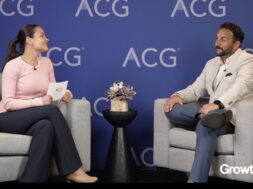PE Sponsors and Strategics Get Proactive to Compete
DealMAX panelists say experience with past downturns offers optimism in today’s market

Competition between private equity investors and strategic acquirers remains robust midway through 2023, even in a challenging dealmaking environment, according to speakers on a recent panel held at this year’s ACG DealMAX conference.
Dealmakers convened at the “Strategies for Adapting Your Dealmaking Approach to a Changing Economic Climate” panel on Tuesday, May 9 to discuss their experiences and observations of the middle-market M&A ecosystem as interest rates and inflation continue to place downward pressure on investors.
Hosted by the DealMAX Women’s Committee, the panel, moderated by Baird Managing Director, Medical Products and Industrial Technology Trish Renner, included private equity, strategic acquirer and investment banking executives.
Panelists agreed that while current headwinds may require acquirers to adjust due diligence strategies or deal structures, a proactive approach to M&A in the middle market can empower acquirers to land the strongest targets with the highest growth potential.
Competition Between PE Firms, Strategics Remains Strong
While high inflation and rising interest rates are oft-cited pressures in the M&A landscape, investors in the middle and lower ends of the market aren’t finding these challenges to be as limiting as those transacting at higher valuations, the panelists noted.
“We haven’t been affected as much by interest rates,” said Kristina Heinze, partner at private equity firm ParkerGale Capital, who adds that her firm is focused on high-growth, earlier-stage companies that require less leverage. “We’re seeing financial sponsors and strategics are still out there. Everyone is looking for that good deal, the right asset.”
There are various factors that can drive an acquisition target toward a private equity sponsor or strategic acquirer, depending on that business’s needs and goals. During the M&A boom of 2020-2021, when the cost of capital remained low, private equity firms often won out over strategics by offering the highest price for an acquisition. Today, that playing field has leveled somewhat, allowing for some strategics to ramp-up acquisition initiatives.
Undoubtedly, the highest price will continue to be an important factor for many business operators looking to exit. But sellers are increasingly understanding they probably won’t see the same valuations of a few years ago. Instead, they’re motivated to sell by a slew of other factors that shape whether a PE sponsor or strategic acquirer might be the best fit.
Whether it’s with industry expertise and insights, or the ability to preserve the reputation and values of a family-owned brand, each investor brings different strengths to the table. Leaning into the opportunity to differentiate themselves will help PE firms and corporates stay competitive.
Investors Get Proactive
‘A’ companies are still getting ‘A’ deals.
Amy LaBan
Canaccord Genuity
While the conversation across middle-market M&A is still dominated by concerns over macroeconomic headwinds, Amy LaBan, managing director of the U.S. financial sponsors group at investment bank Canaccord Genuity, said investors and sellers alike are still willing to put in the effort to make transactions happen.
“‘A’ companies are still getting ‘A’ deals,” she noted.
But business development professionals won’t necessarily be seeing those “A companies” falling in investors’ laps. Instead, a challenging market requires investors to get creative with deal sourcing and has added pressure on due diligence to assess both macro and microeconomic influences, which has slowed the process down somewhat, according to ParkerGale’s Heinze.
Related content: Rethinking the Investment Banker’s Role in a 2023 M&A Market
Still, panelists said their experience with past periods of market turmoil allows them to understand that today’s challenges can create valuable opportunities for tomorrow.
“Having gone through the Great Recession, COVID … you’ve seen all different things,” noted Kelly Cornelis, partner and COO of investment firm LaSalle Capital. “We may have to change the way we’re looking at certain things—structures of deals may change, there may be more earnouts in proposals because we have to assess the risk differently—but we’re still looking at a lot of opportunities.”
Cornelis added that the most proactive investors will be those that find the strongest acquisition prospects. And while the deal pipeline may have decelerated, the current M&A slowdown offers investors the chance to focus on their existing portfolios and drive value for LPs. “We’re not just going to sit around and wait for things to pick up,” she said.
Heinze agreed, adding that a market downturn is an excellent time for acquirers to practice proactivity. “Let’s use this time wisely, because it could then lead to a really good deal that you wouldn’t have otherwise seen, because it didn’t come to you. You found it.”
Carolyn Vallejo is Middle Market Growth’s digital editor.


